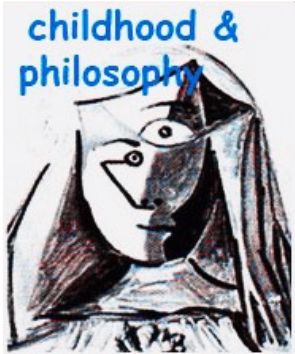existential urgency: a provocation to thinking “different”
DOI:
https://doi.org/10.12957/childphilo.2023.71997Keywords:
Heidegger, Merleau-Ponty, embodiment, thinking, sensibility.Abstract
In this essay we expand the notion of thinking by emphasizing the provocation and urgency to think and by reconceptualizing thinking as an embodied practice. The aim is to expand Lipman and Sharp’s approach to philosophical inquiry with children and show how other ways of thinking can be included. We strive to unfold a way of “thinking” that is both different from rationality (critical thinking) as well as from creative and caring thinking. In the first part of the paper, we discuss the merits of Lipman and Sharp’s critical, creative and caring thinking within the Community of Philosophical Inquiry (CPI). We then expand Lipman/Sharp’s philosophical method through Ekkehart Marten’s Five-finger Model, which allows for different philosophical approaches. In the second half of the paper, we draw on Martin Heidegger’s What is called thinking? to develop his concept of the “call” to think together with its related notions of provocation and urgency. Building on this, we draw on Maurice Merleau-Ponty to show how this call is not an intellectual activity or mere exercise of the “mind” but rather affects our entire existence. As such, thinking becomes a response to an existential urgency that is an embodied practice. Using concepts like embodiment, affect, and sensibility, we try to widen our conception of thinking in a CPI. Finally, we hope this will allow facilitators to hear the unique voice of every child so that no one is left unheard.Downloads
References
Aslanimehr, P. (unpublished manuscript). Exilic Subjectivity.
Carvalho, M. C., & Mendonça, D. (2017). Thinking as a community: reasonableness and emotion. In M. R. Gregory, J. Haynes & K. Murris (Eds.),The Routledge International Handbook of Philosophy of Children (pp. 127-134). Routledge.
Gregory, M., Haynes, J., & Murris, K. (2017). The Routledge International Handbook of Philosophy for Children. Routledge.
Gregory, M. R., & Laverty, M. (2018). In Community of Inquiry with Ann Margaret Sharp: Childhood, Philosophy and Education. Routledge.
Hadot, P. (1999). Wege zur Weisheit. Eichborn.
Haynes, J., & Murris, K. (2021). right under our noses: the postponement of children’s political equality and the now. childhood & philosophy, 17(fev), 1- 21.
Heidegger, M. (1954). Was Heisst Denken? Max Niemeyer Verlag.
Heidegger, M. ([1954]1968). What is Called Thinking? Harper & Row, Publishers.
Heidegger, M. ([1959]1966). Discourse on Thinking. Translated by John M. Anderson & E. Hans Freund. Harper & Row Publishers.
Heidegger, M. (1971). Poetry, Language, Thinking. Translated by Albert Hofstadter. Harper & Row, Publishers.
Heidegger, M. ([1969]1972). On Time and Being. The University of Chicago Press.
Kennedy, D. (2012). Lipman, Dewey, and the Community of Philosophical Inquiry. Education & Culture 28(2), 36-53.
Kennedy, D. (2020). Community of philosophical inquiry and the play of the world. Teaching philosophy, 41, 285-302.
Kennedy, D., & Kohan, W. (2008). Aión, Kairós and Chrónos: Fragments of an Endless Conversation on Childhood, Philosophy and Education, childhood & philosophy, 4(8), 5-22.
Kohan, Walter. (2002). Education, Philosophy And Childhood. Thinking: The Journal of Philosophy for Children, 16(4-11). 10.5840/thinking20021612.
Kohan, W. (2006). Gilles Deleuze: Childhood and becoming-child. childhood & philosophy, 2(3), 11-27.
Kohan, W. (2011). Childhood, education and philosophy: Notes on deterritorialisation. Journal of Philosophy of Education, 45(2), 339-357.
Kohan, W. (2016). Time, Thinking, and the Experience of Philosophy in School. Philosophy of Education Yearbook 2016.
Kohan, W. (2018). Paulo Freire and Philosophy for Children: A Critical Dialogue. Studies in Philosophy and Education, 37, 615-629.
Lipman, M. (1967). What Happens in Art. New York: Appleton Century Crofts.
Lipman, M. ([1993]2003). Thinking in Education. Cambridge University Press.
Louisiana Channel. (2020, November). Sayaka Murata Interview: A Creature In My Own Right [Video]. Youtube. https://youtu.be/GtVYanNYl2Y
Martens, E. (1999). Philosophieren mit Kindern. Reclam.
Martens, E. (2003). Methodik des Ethik- und Philosophieunterrichts. Philosophieren als elementare Kulturtechnik. Siebert.
Mensch, J. (2009). Embodiments: From the Body to the Body Politic. Northwestern University Press.
Merleau-Ponty, M. ([1945]2012). Phenomenology of Perception. Translated by Donald A. Landes. Routledge.
Merleau-Ponty, M. ([1964]1964). Eye and Mind. In J. E. Edie (Ed.), The Primacy of Perception. (C. Dallery, Trans., pp. 159-190). Northwestern UP.
Merleau-Ponty, M. ([1964]1968). The Visible and the Invisible. Translated by Alfonso Lingis. Northwestern University Press.
Rilke, Rainer Maria. ([1923]2000). Duino Elegies (Trans. Snow, E.). North Point Press.
Sharp, A. M. (2014). The other dimension of caring thinking. Journal of Philosophy in Schools, 1(1), 15-21.
Sharp, A. M. (2018). Self-transformation in the community of inquiry. In M. Gregory & M. Laverty (Eds.), In Community of Inquiry with Ann Margaret Sharp (pp. 49-59). Routledge.
Weber, B. (2011). Childhood, Philosophy and Play: Friedrich Schiller and the Interface between Reason, Passion and Sensation. Journal of Philosophy of Education, 45(2), 235-250.
Weber, B. (2013). Vernunft, Mitgefühl und Körperlichkeit: Eine Phänomenologische Rekonstruktion des politischen Raumes [Reason, Empathy and Embodiment: A Phenomenological Reconstruction of Political Space]. Verlag Karl Alber.
Weber, B. (to be published). ‘Another Beginning: On Birth, Childhood, and the Existential State of Being Human’.
Wolf, A. C. (2023, to be published). Affect Theory and Philosophical Inquiry with Children.



